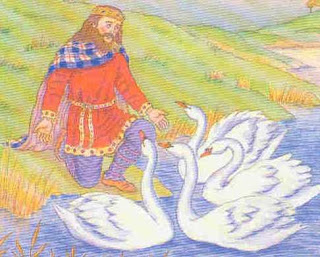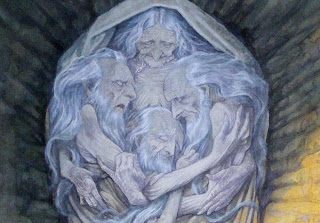Sa nu confundati regele acesta irlandez cu Regele Lear, al lui Shakespeare. E o poveste diferita, cu alt deznodamant. Am aflat despre ea intamplator, pornind de la un superb cantec al formatiei irlandeze, Cruachan, postat de prietena mea Kamilia pe fb, cantec numit Ride On. Cautand si alte cantece ale acestei formatii am fost atrasa de titlul acesta, Chidren of the Lir si am cautat versurile. Am sa le copiez si o sa le traduc. Apoi o sa inserez un spectacol prezentat la Cutler Majestic Theater in Boston, Massachusetts, on December 19. Daca vreti insa sa cititi povestea trebuie sa mergeti aici.
In a time of myth and magic,
lived a man of timeless power,
Lir was his name,
but his temper had turned sour.
He would not be king of the land,
Bov Dearg was chosen instead.
Lir would pay no tribute to him,
And secretly wished he was dead.
Intr-o vreme plina de magie si mister
Traia un om cu puteri ce depaseau timpul
Pe numele sau Lir
Dar s-a infuriat foarte rau
Cand in loc sa fie el regele acelui tinut
A fost ales Bov Dearg.
Lir nu a vrut sa-i plateasca tribut
Si ar fi dorit in schimb sa il vada mort.
Alas with time Lir's wife did die,
and he was full of great sadness,
Dearg heard this and sent word to Lir,
to meet with him in his palace.
When they met they both embraced,
Their friendship was made then.
Dearg summoned his daughter Eve,
And told Lir he must marry again,
Dar vai, sotia lui Lir a murit
si el a fost cuprins de o mare tristete.
Dearg a auzit asta si i-a trimis vorba lui Lir
Sa vina la palat sa se intalneasca.
Cand s-au intalnit s-au imbratisat
Si au devenit prieteni la catarama.
Dearg a chemat-o pe Eve, fiica lui,
Si i-a spus lui Lir ca trebuie sa se insoare din nou.
Lir's love for Eve was as strong as with his first wife,
A seed was planted, Fionnula and Aedh were born.
But her next child birth would take away her life,
Fiachra and Conn, from their mothers stomach were torn.
Lir o iubea pe Eva tot atat de mult ca si pe prima nevasta
si a plantat seminte din care s-au nascut Fionulla si Aedh
Dar la urmatoarea nastere si-a pierdut viata
Fiacra si Conn au trebuit sa fie scosi din burta ei.
Lir's sadness knew no bounds -
he cried out to the night,
Dearg was there to comfort him
and help him see the light.
He had 4 beautiful children
and with time another bride,
Eve's sister Aoife would stay loyal to his side.
Durerea lui Lir era nesfarsita
plangea toata noaptea
Dearg a fost langael sa-l aline
si sa-l ajute sa vada lumina.
Avea 4 copii frumosi
si cu timpul isi va lua alta nevasta
Sora Evei, Aoife o sa-i fie credincioasa.
But Aiofe had a jealous side - a canker in her mind,
She moved against the children, love for them she could not find.
She took them in her chariot to a lake not far away.
And changed them into swans like night time into day.
Dar Aiofe era cam geloasa, o rodea ca un cancer
Si s-a pornit impotriva copiilor, nu era in stare sa ii iubeasca.
I-a luat in trasura si i-a dus la un lac nu prea indepartat
S i-a schimbat in lebede cum se schimba noaptea in zi.
300 years on Derravaragh, so commenced the spell,
the children would swim to the shore, their story to tell.
300 years on the sea of Moyle, a cruel and bitter place,
The children missed their father here, the smile upon his face.
In Derravaragh, timp de 300 de ani, asa incepea blestemul,
copii vor innota catre tarm, ca sa-si spuna povestea
300 de ani pe marea din Moyle, un loc aspru si crud
Copiilor le era dor de tatal lor, de fata lui zambitoare
In the sea of Moyle the waves did crash,
and beat the land with might,
The rain fell fierce and the wind blew hard,
the swans all feared for their lives.
Fionnula was strong and wisest of all,
And guarded her brothers from strife.
Under her wings they hid from night,
And waited for the morning light.
In marea din Moyle valurile izbesc
Si bat pamantul cu putere
Ploaia cade salbatica si vantul sufla cu putere
lebedele se temeau pentru viata lor.
Fionulla era cea mai puternica is cea mai intelepta dintre ei
Si isi pazea fratii sa nu dea de necaz.
Ei se ascundeau sub aripile ei
Si asteptau acolo lumina diminetii.
Finally the day did come,
to leave this terrible sea,
300 more years to live as swans,
then they at last would be free.
To Inish Gluaire the swans did fly,
As fast as they could go.
New lands and kingdoms everywhere -
Fionnula did see down below.
In sfarsit a venit ziua
Sa paraseasca acesta mare ingrozitoare
Dupa 300 de ani in care au trait ca lebede
Erau in sfarsit libei.
Lebedele au zburat cat de repede au putut
Catre Gluaire in Irlanda.
Fionnula a vazut jos
pretutindeni pamanturi si regate noi.
Va amintiti "Tinerete fara batranete, viata fara de moarte" al lui Ispirescu? Cand eroul s-a intors dupa ani de zile petrecuti in valea fermecata a zanelor nu a mai recunoscut locurile in care traise, totul era complet schimbat. In plus a imbatranit brusc si apoi a si murit. Veti vedea mai jos ca asa s-a intamplat si cu copii lui Lir. Eu crad ca basmul irlandez e mai vechi decat cel romanesc, dar ma indoiesc ca Ispirescu il cunostea.
There they waited, till at last the day did dawn,
The spell was ending,
they felt themselves transform.
They were now ancient,
their youth was gone forever,
And as they died,
they held hands and went together.
Acolo au asteptat, pana cand in sfarsit au venit zorile
Si s-a risipit vraja.
Iar ei au simitit ca se transforma.
Acum erau batrani
tineretea le-a disparut pe vecie
Si, in timp ce mureau
S-au tinut de maini ca sa piara impreuna.
O varianta f pe scurt a povestii din momentul blestemului pana la final suna asa:
They
were cursed to swim as swans for 900 years, 300 years each on different
lakes. To end the spell, they had to hear the bell toll for the new God
of Ireland. At the end of the 900 years, a holy man visited the lake
and spoke to the swans. Upon learning of the curse and how to break it,
he tolled teh bell of the church and the curse was broken. But as the
children returned to human form, they also began to age the 900 years
spent prior and died soon after the spell was broken.
Au fost blestemati sa inanoate ca lebede timp de 900 de ani, cate 300 de ani in fiecare din cele trei lacuri. Ca sa se risipeasca vraja trebuiau sa auda clopotul care se tragea pentru Dumnezeul cel nou al Irlandei. Si la sfarsitul celor 900 de ani un sfant a vizitat lacul si a vorbit cu lebedele. Auzind despre blestem si cum se rupe a tras clopotul bisericii (nu pot sa nu ma intreb de ce, daca tot era o biserica ce avea un clopot in dotare, nu l-a tras nimeni pana atunci) Si vraja cea rea s-a rupt. Dar cand copii s-au reintors la forma umana au inceput sa simta urmarile celor 900 de an ipetrecuti inainte si sa imbatraneasca, murind la scurt timp dupa ce s-a rupt vraja.
In spectacol ei erau fericiti pentru ca, atunci cand s-a risipit vraja, s-au intalnit cu tatal lor in cer. Iar in mai multe variante ale povestii se insista asupra faptului ca inainte de a muri ei au cerut salvatorului lor sa ii boteze neaparat, ca sa moara crestini.
Insa povestea e recunoscuta ca fiind una dintre povestile triste ale Irlandei. Povestea am gasit-o povestita si repovestita in prea multe variante ca sa le mai pun aici linkuri. Aceasta este o poveste populara, nu culta. Dar inca mai simt in gura gustul amar pe care mi l-au lasat povestile lui Oscar Wilde, in care era o tristete aproape insuportabila pentru sufletul meu de copil. Cam triste sunt si multe dintre povestile coreene, cum ar fi cea cu taietorul de lemne, sau cea cu tesatoarea, care sta la baza festivalului Tanahata.
Ce am retinut este ca bietul Lir, de parca nu i-a fost de ajuns ca nu si-a implinit ambitiile de marire, nu numai ca nu a prea avut noroc la neveste, dar nu a avut parte nici de copii. Iar copiii, dupa ce s-au chinuit 900 de ani pe cele trei lacuri, cand in sfarsit s-a gasit un crestin care sa sune din clopotul care urma sa ii elibereze de vraja s-au trezit dintr-odata batrani ca vremea, fara sa se bucure si ei de dragostea care duce la perpetuarea speciei. Dar macar o mangaiere au avut, ca au murit botezati (deh, Irlanda e una dintre tarile in care catolicismul e inca f puternic inradacinat in popor)
Ed Org
John D. Batten
Paula Tabor
J. P. Linch
Matt Doyle
John Duncan
Emily E Weichbrod
Shauna Blumingale
The Straits of Moyle. John Quigley
Leaving Lough Derravaragh John Quigley
Created during workshops over a six week period by clients and staff at Glenmona Resource Centre, Cushendun, Co. Antrim.
Deirdre O'Reilly
John D. Batten
H.R. Millar's illustration of Lêr and the Swans, 1905.
P J Lynch
Gennady Spirin, The Children of Lir
A sculpture of the Children of Lir at The Garden of Remembrance in Dublin.




































Niciun comentariu:
Trimiteți un comentariu